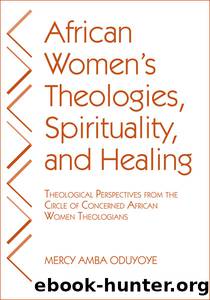African Women's Theologies, Spirituality, and Healing by Oduyoye Mercy Amba;

Author:Oduyoye, Mercy Amba; [Oduyoye, Mercy Amba]
Language: eng
Format: epub
Tags: REL062000 Religion / Spirituality
ISBN: 6039416
Publisher: Paulist Press
Published: 2019-12-19T00:00:00+00:00
9
The Circle and HIV/AIDS
A third arena in which African women theologians have functioned as researchers, writers, educators, and counselors is that of the scourge of HIV/AIDS. Two years after the Circleâs second pan-African conference, Musimbi Kanyoro, the first elected general coordinator of the Circle, proposed an emergency convocation of the conference in 2002. Kanyoro had moved from her position in the Lutheran World Federation offices in Geneva to the World Young Womenâs Christian Associationâs head office (also in Geneva) and had found it necessary to employ a liaison officer to help with her coordination of the Circle. Joyce Boham became the first paid staff member of the Circle and was located at the Institute of Women in Religion and Culture, what is now Trinity Theological Seminary (TTS), Legon. You will remember that the institute had grown out the Circleâs commission on African Women in Religion and Culture, three of whose members, Rabiatu Ammah, Elizabeth Amoah, and myself, were living in Ghana. Joyce was located at the Institute to be guided more immediately by us while she received her assignments and reported directly to Musimbi in Geneva. Joyce had just obtained her higher national diploma in administration and was on the verge of getting married. She did get married and now has a masters in educational administration, a husband and four children, and still works for the Women in Religion and Culture project at TTS.
The project had five other young people, three of them transitioning from high school to the tertiary stage: four young women and one young man who made a computer design that eventually became the building we named Talitha Qumi Centre. This team of young people was the engine of the Circleâs first HIV/AIDS conference. The scourge was taking away Africaâs young people and yet it was taboo to speak about it. Indeed, it was referred to as ammodzinâthat which should not be named. Even after it had received âlegitimateâ attention, it continued to be taboo. A Muslim youth group in Northern Ghana that wanted to have a âway forward seminarâ on the pandemic had to resort to subterfuge in naming it. They presented their project to their elders as a meeting on the unemployment of youth.
So why are African women theologians stepping into this cesspool? What was the emergency? Through the grapevine, we learned that one of us had lost her high-profile husband to the scourge. Some of us had young people dying around us from the mysterious killer but were all keeping quiet. Musimbi said no more sitting on the fence. She called the conference, got the YWCA of Ethiopia to host it, and centered it on HIV/AIDS.
It was a most dynamic and moving experience. Ethiopia YWCA and the entire Christian community welcomed us. From there, follow-up meetings were held, and several offered to conduct further research, including Fulata Moyo, who later served as the third pan-African coordinator for the Circle. This was facilitated by Margaret Farley of Yale Divinity School. The Circle research scholars also worked with the Yale School of Public Health.
Download
This site does not store any files on its server. We only index and link to content provided by other sites. Please contact the content providers to delete copyright contents if any and email us, we'll remove relevant links or contents immediately.
The 5 Love Languages: The Secret to Love That Lasts by Gary Chapman(8525)
The Space Between by Michelle L. Teichman(6096)
Assassin’s Fate by Robin Hobb(5253)
Wiseguy by Nicholas Pileggi(4600)
Everything Happens for a Reason by Kate Bowler(4075)
Gerald's Game by Stephen King(3927)
A Simplified Life by Emily Ley(3579)
The Power of Positive Thinking by Norman Vincent Peale(3460)
Pillow Thoughts by Courtney Peppernell(3412)
Resisting Happiness by Matthew Kelly(2891)
Girl, Wash Your Face by Rachel Hollis(2828)
Being Aware of Being Aware by Rupert Spira(2711)
Name Book, The: Over 10,000 Names--Their Meanings, Origins, and Spiritual Significance by Astoria Dorothy(2496)
Real Sex by Lauren F. Winner(2480)
More Language of Letting Go: 366 New Daily Meditations by Melody Beattie(2455)
The Holy Spirit by Billy Graham(2425)
Fast Facts on Defending Your Faith by John Ankerberg & John Weldon(2394)
Victory over the Darkness by Neil T. Anderson(2389)
The Secret Power of Speaking God's Word by Joyce Meyer(2257)
